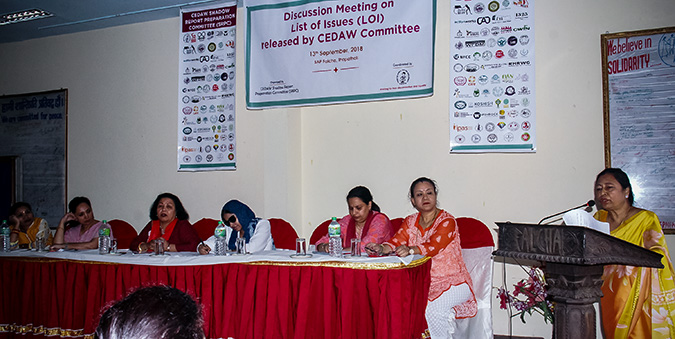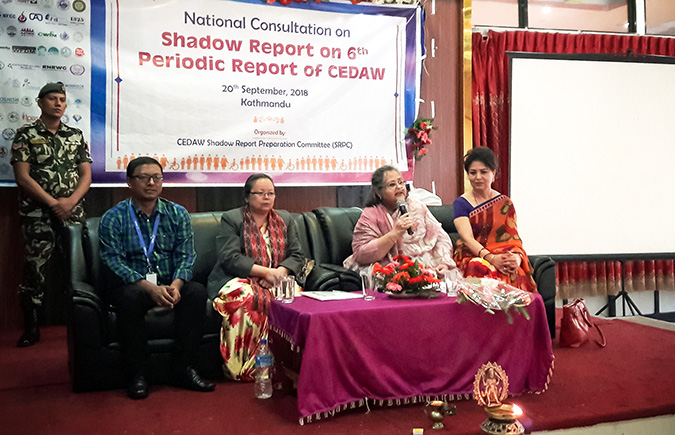Civil Society Organizations in Nepal voice concerns in CEDAW Shadow Report
Date:
Author: Palmu Sherpa and Prem Bahadur Thapa
Kathmandu, Nepal — Half of all political party representatives should be women; child marriage laws need to be implemented; and discriminatory sections of Nepal’s new Civil Code must be amended. These were just a few of the recommendations stemming from civil society consultations held in seven provinces across Nepal, which culminated in a national event in Kathmandu on 20 September.

They will feed into a Shadow Report by Nepal’s Civil Society Organisations (CSOs) to the Committee tasked with monitoring the Convention on the Elimination of all Forms of Discrimination against Women (CEDAW). The consultations were arranged by the Forum for Women, Law and Development (FWLD), with technical and financial support from various development agencies, including UN Women.
“This is a historical moment as members of the Government, CSOs, CEDAW Committee member and young leaders from the women’s and human rights movement are coming together in this process,” said meeting chair Chandni Joshi, President of Women-Friendly Disaster Management (WFDM), a non-governmental network.
Bandana Rana, who is among the 23 current members of the CEDAW Committee and is from Nepal, shared her experiences and provided feedback to the Government and civil society. She said the partnership between Nepal’s Government and CSOs is moving forward in an exemplary manner and she urged them to raise their issues collectively.
Tham Maya Thapa, Minister for Women, Children and Senior Citizens, promised that the Government would do just that, addressing feedback and concerns in a coordinated manner to support gaps in implementation of laws and policies. “The Ministry is committed to advancing women’s empowerment and gender equality,” she said, adding that CEDAW principles are integrated in the Constitution of Nepal.Civil society recommendations stemming from the seven provincial consultations covered a range of topics. To confront gender-based violence, they highlighted the need for: a broader definition of human trafficking to include a comprehensive definition of exploitation and labour, effective implementation of the existing law against child marriage, and improved access to justice. They also suggested mobilizing community-based religious leaders and traditional leaders to end all forms of violence against women.
To spur women’s political participation, CSOs recommended requiring political parties to ensure 50 per cent representation for women, and that 33 per cent of seats be reserved for women on both the Council of the Ministers and structural management committees. They equally stressed the need for women’s leadership to be ensured in humanitarian contexts and in disaster management committees.

Participants highlighted that provisions in Nepal’s new Civil Code still discriminate against women and called for a specific act to regulate the entertainment sector. They called for policies to assist rural women in particular; for maternity leave to be guaranteed across both the formal and informal sectors; and for women’s unequal and unpaid share of both care and domestic work to be addressed.
They also emphasized that more attention should be given to the intersectionality of gender and the multiple forms of discriminations that LGBTIQ+, women with disabilities and indigenous women face. Recommendations equally identified the need for disaggregated data to inform policymaking and to ensure that the National Women’s Commission has sufficient resources to carry out its mandate.
UN Women Deputy Representative Gitanjali Singh emphasized that the shadow reporting process was, and should be, inclusive and representative and she appreciated the fact that CSOs and the Government are engaging in constructive dialogue. “UN Women is committed to working with CSOs, women’s groups and the Government of Nepal to support the implementation of the CEDAW Concluding Observations that will be received later in the year,” she said.
As an implementing party and the Secretariat of the CEDAW Shadow Report Preparation Committee Nepal, FWLD led the drafting process of the Shadow Report, in collaboration with 50 CSOs, who participated by sharing their recommendations on different articles of the Convention.
States report on their progress to the CEDAW Committee once every four years. The Committee assesses progress by looking at the official Government report and accompanying shadow reports from civil society. This Shadow report will contribute to the 71st session of CEDAW scheduled on 22 October 2018 in Geneva, which will review Nepal’s sixth periodic report to the Committee.